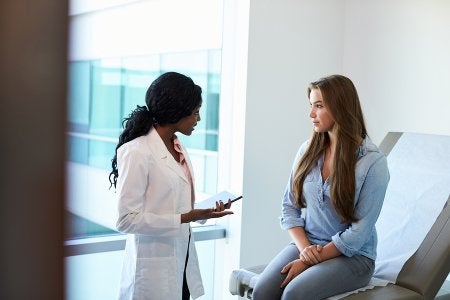-
What Happens If the Abortion Pill Doesn’t Work the First Time?
Pregnancies of fewer than six weeks—calculated by menstrual age—may be terminated with abortion pills. Also known as a chemical abortion, the pills work by halting the progression of the pregnancy and expelling it. This occurs much like a natural miscarriage does. Although rare, it’s possible for the pills to complete the termination. You can reduce the risk of this happening by letting your gynecologist know if you’ve been having morning sickness. You could take an anti-nausea drug to prevent yourself from throwing up the pills.

If your next appointment reveals that the termination is incomplete, you may have the option of taking the pills again. If you prefer to have an in-office procedure, your doctor can schedule this appointment promptly. Some women may have to have a surgical abortion, such as if they are past the six-week point when it becomes apparent that the termination failed.
At Washington Surgi-Clinic, our team of compassionate gynecologists in Washington, D.C. is committed to maintaining strict standards of patient confidentiality . For safe, legal abortions, call (202) 659-9403.
-
What Not to Do Before Your Pap Smear
Even if you’ve had a pap smear before, you might not be familiar with everything you should and shouldn’t do before you see your gynecologist. For instance, you shouldn’t schedule your appointment for the week that you’re expecting your period. You also shouldn’t have sex for at least 24—but preferably 48—hours beforehand, as this can interfere with the results.
Watch this video for other important tips. A doctor featured here explains that grooming doesn’t matter, but the use of feminine products does. Avoid douching, and avoid using any creams or spermicidal foams.
Washington Surgi-Clinic provides pap smears in our clinic in Washington, D.C., as well as a full range of other gynecology services. Call (202) 659-9403 to request an appointment.
-
What to Do After Surviving a Sexual Assault
The most important thing to know after surviving a sexual assault is that it wasn’t your fault. You did nothing wrong, and you have the right to seek medical care , request police assistance, and use local resources that can support you. Survivors are encouraged to go to the ER promptly. If you don’t feel comfortable doing this, or you’d just prefer to see your own trusted gynecologist, you should certainly feel free to do so.

Get to a safe place.
Your first priority is to get away from the attacker. If you can’t call 911 right away, try to get to a public place. If you’re at home, go to a neighbor’s house. If you’re in an urban area, go to the nearest establishment, such as a restaurant or store. People there can assist you, and your attacker is unlikely to follow you to a public place. It’s not uncommon for survivors to know their attackers. For instance, if you’re a college student, you might have been assaulted in your dorm room by someone you know. Get to a friend’s room or find your resident assistant.
Preserve the evidence.
It’s normal to want to take a shower, but try to resist this urge. Even if you think you might not report the rape, you might change your mind later. Preserving the evidence will give you the opportunity to seek justice. Before a medical provider can do a sexual assault exam, you’ll need to avoid doing any of the following:
- Bathing
- Douching
- Changing clothes
- Brushing teeth or hair
- Eating or drinking
Obtain morning-after pills.
A gynecologist can provide you with morning-after pills, or you can obtain them at a pharmacy without a prescription. Follow the instructions carefully to prevent an unintended pregnancy. Know that morning after pills do not induce an abortion. If you obtain these pills right away, it won’t be possible for you to be pregnant yet.
Contact a rape crisis center.
A rape crisis hotline or center will give you the confidential and empowering guidance you need during this difficult time. You’ll learn about your legal rights and options, and your decision to either report or not will be respected.
Women who need morning-after pills in the Washington, D.C. area can trust the professionals at Washington Surgi-Clinic. Our kind and courteous gynecologists want sexual assault survivors to know that we offer confidential care that respects the choices of the patient. Call (202) 659-9403.
-
Common Questions Gynecologists Hear from Teens
All teens who have a vagina should see a gynecologist for regular wellness check-ups. It’s important for teens to find a doctor they feel comfortable with, as it may be necessary to ask some sensitive, personal questions. Remember that doctors have heard it all before—there are no silly or insignificant questions. In fact, gynecologists want their patients to ask lots of questions because better-informed patients are healthier patients.

Do transgender boys need to see a gynecologist?
Everyone who has a vagina needs gynecology care, including transgender boys who have not had gender-affirming surgery. Medical care is often a difficult subject among trans individuals, and it’s not uncommon to hear of someone who hasn’t seen a doctor in years because of the stigma. Transgender boys who find a gynecologist they’re comfortable with may be more likely to continue scheduling preventive wellness services in the years to come.
Why do I keep getting yeast infections?
Yeast infections are uncomfortable and sometimes downright painful. It’s advisable to see a gynecologist for an accurate diagnosis, just in case your yeast infection is actually another medical problem. You’ll also receive effective treatment from your doctor. If you struggle with recurrent yeast infections, your doctor may recommend some lifestyle changes, such as avoiding douching, wiping from front to back, and wearing looser-fitting clothes made from natural fibers.
Is it normal for tampons to hurt?
Putting in a tampon shouldn’t hurt, but it often does if you haven’t had much practice with it yet. Insertion is more difficult if you’re tense, as the muscles will contract. Some girls try to insert the tampon straight up, but there’s a curve to the vaginal canal. Instead, angle it toward the small of your back. Always use an appropriate kind of tampon that corresponds to your flow, and consider giving sponge tampons a try. Remember that tampons dry out the vaginal walls—alternate with pads frequently.
You’ll find warm, welcoming staff and a comfortable atmosphere at Washington Surgi-Clinic , where the well-being and privacy of our patients are our top priorities. We offer wellness exams, STD testing, birth control, and pregnancy termination services in Washington, D.C. Get in touch at (202) 659-9403.
Recent Posts
Popular Posts
categories
- Uncategorized
- STD
- Washington Surgi-Clinic
- Abortion
- Pregnancy
- Pap Smears
- Birth Control Options
- HPV
- Gynecologist
- Pregnancy Test
- Abortion Safety
- IUD
- Pregnancy Termination
- First Trimister
- Cervical Cancer
- Morning After Pill
- Birth Control Pills
- Chlamydia
- Birth Control Shot
- Gonorrhea
- STD Testing
- Birth Control Implant
- Pelvic Pain
- Birth Control Patch
- HIV
- HPV Vaccine
